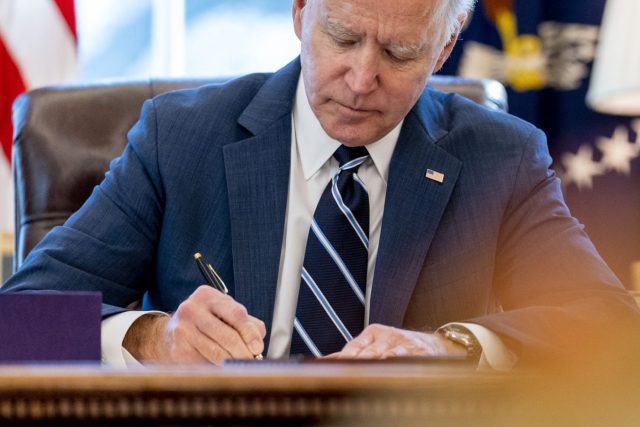
By Carter Dewees
For The Birmingham Times
President Joe Biden delivered on a huge campaign promise when he signed his American Rescue Plan Act into law bringing economic relief from COVID-19 to millions across the U.S., but political science professors at Alabama universities had varying opinions on what the stimulus package could mean for the President in the midst of Congressional deadlock.
The controversial $1.9 trillion rescue plan sat in the spotlight through every turn as provisions were debated. Though Biden and Congressional Democrats met with Republicans about the bill, the final version passed along party lines, 220-211 in the House of Representatives and 51-50 in the Senate, with Vice President Harris casting the tie-breaking vote.
The plan provides for direct stimulus payments for most Americans; extended unemployment benefits; increased food aid; expanded Child Tax Credit; aid to schools and childcare block grants; help for businesses; pandemic response and $350 billion in aid to states, cities, tribal governments, and U.S. territories.

Lee Trepanier, Chair of the Political Science department at Samford University, considers the American Rescue Plan to be “by all measures” a significant accomplishment for the Biden Administration coming within the first 100 days of the president’s term, but notes observers should wait to pass judgement on its electoral impact.
“If it turns out to really boost the economy and help people in need, it will certainly solidify or give Democrats an advantage in the midterms, but if there’s waste and fraud, or it contributes to inflation, it could backfire and Republicans will have an issue to run on 2022,” said Trepanier.
Thin Margins
Ryan Williamson, an Assistant Professor of Political Science at Auburn University, said the American Rescue Plan may have passed by thin margins but the immediate and long-term economic impact of the legislation will be remembered, rather than the slim voting margin.
For example, the Recovery and Reinvestment Act passed under President Obama not many people were fixated on the vote margins, but asked whether it actually “accomplished what it set out to accomplish” said Williamson. The Recovery and Reinvestment Act of 2009 was passed in the aftermath of the Great Recession, with the goal of rescuing and kickstarting a then-devastated American economy.
Pete Jones, Assistant Professor of Political Science and Public Administration at The University of Alabama-Birmingham (UAB), said some key provisions of the Biden relief package may

outweigh the impact of stimulus checks over time.
Federal dollars will lead to the biggest education budget in Alabama “that we’ve seen,” he said. Additionally, money directed toward bolstering the budgets of local governments could have a big impact, particularly in Alabama.
Jones noted the Child Tax Credit provision in the Act will significantly target child poverty, which the Biden administration has been outspoken about trying to address. Jones also said that if the federal government is spending more to lift children out of poverty, it will lessen the need for states like Alabama to spend more money on Medicaid, freeing up money to be spent in other ways.
Senate Democrats used a process called “reconciliation” to pass the American Rescue Plan, which is essentially a loophole which allows the party in power to bypass the filibuster once a year. The filibuster is a rule in the Senate which requires 3/5 of the Senate to agree to begin voting on a particular bill.
The filibuster has become a point of contention in Democratic circles as of late, with Democrats like Sen. Raphael Warnock (GA) seeking to pass ambitious legislation, while moderate Senators like Sen. Joe Manchin (WV), have resisted calls to eliminate the Senate tradition.
Broader Outlook
Trepanier notes that most Presidents in the modern era do not have extensive Congressional experience, with most coming from Governor’s Mansions. Trepanier says this leads to a broader outlook for President Biden, who likely understands the limitations placed upon the Executive Branch by Congress.
Jones notes Biden may prove to be more patient with Congress than Obama and Trump who had much less experience with the inner workings of the Senate. Even though many focus on Biden’s time in the Senate, it is his time as Vice President that will be most beneficial in his administration, Jones said. Biden has experience in the modern, sharply divided political climate and that gives him insight on how to set expectations.

Looking ahead, Williamson believes it will be possible for Biden to accomplish more policy victories, though it could put some Democrats in Congress in a precarious situation ahead of the 2022 midterms. With Democrats currently holding delicate majorities in both chambers. Trepanier notes it will be very difficult for Democrats to pass new legislation while the filibuster is in place, but said Biden can make a lasting impact on the Judicial Branch, because each judge can be confirmed with 50 votes in addition to Harris’s tie-breaking vote.




